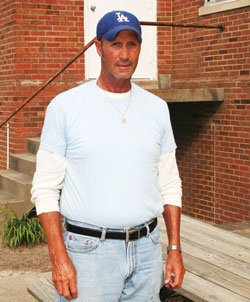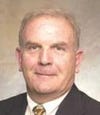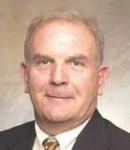August 29, 2010

Frank Bryant is a self-professed Virginia farm boy. In his life he’s been on the cusp of fame and fortune, and he’s been to hell and back a couple of times because of it.
Now in his early 50s, Frank is a researcher at Virginia Tech’s Tidewater Agricultural Research and Extension Center near Suffolk. He works behind the scenes to help Virginia Tech scientist and assistant professor Maria Balota build a research and outreach program geared to help Virginia farmers manage a plethora of production problems.
His road to the Tidewater AREC is filled with the kind of stuff usually reserved for best selling novels and Hollywood movies. Unlike most movies and books, Frank’s story is real — too real for him for a long time.
By the time he got to high school, baseball scouts and coaches, both college and professional were visiting southeast Virginia to watch him throw a baseball. By his senior year in high school, Frank had college scholarship offers in baseball, football and basketball.
Like most kids blessed with Division One college athletic ability, he had to decide which college he would attend. Unlike virtually any other college-bound athlete, Frank Bryant had to first decide which sport he would play in college.
He chose to play baseball at North Carolina State University — partly he says because of their quality baseball program and partly because of their excellent College of Agriculture.
For sure, Frank could have taken the money and rushed his way to the sports spotlight — even after he signed his letter-of-intent to attend North Carolina State, he had several professional baseball teams trying to lure him away from college and to sign a professional baseball contract when he finished high school.
After his junior year at North Carolina State, Frank was drafted in the seventh round of the amateur draft by the Los Angeles Dodgers. During his time with the Dodgers, he was tutored by Hall of Fame pitchers Don Drysdale and Sandy Koufax, mentored by Hall of Fame manager Tommy Lasorda, was signed by legendary Dodger general manager Al Campanis and Dodger scout Jim Garland and roomed with flamboyant Dodger pitcher Fernando Valenzuela.
Unfortunately, too early in his career he met another Dodger sports legend — Dr. Frank Jobe, still one of sport’s most recognized orthopedic surgeons.
The Dodgers put Frank on a fast track to the major leagues. Visions of a Koufax-Drysdale-like duo of Valenzuela and his left-handed array of baffling breaking pitches and Frank’s fastball that occasionally topped the magic 100 mph mark weren’t lost among top Dodger management.
On a cool, damp night in Iowa, pitching for the Dodgers AA farm team, Frank felt something snap in his right shoulder. Several missed diagnoses and a year or so later he met with Dr. Jobe. “Dr Jobe told me I had a torn rotator cuff, and that it had been torn for some time,” Frank recalls.
“Dr. Jobe put my shoulder back together and the Dodgers sent me to a first class physical rehabilitation center in Arizona. Like everything the Dodgers did, it was first class,” he says.
After a year away from baseball, Frank returned to spring training with the Dodgers and the results were better than expected by all accounts. “I was hitting 100 mph with my fastball and throwing changeups and sliders with no pain — I was on top of the world and ready to get on with playing professional baseball,” he recalls.
He was flown from pitching in the Florida State League to pitch on a special assignment for two Dodger super scouts and Hall of Fame Pitcher Sandy Koufax. Finally, the stage was set for Frank Bryant, one-time Virginia farm boy, to become a major league star.
That wasn’t to be! On a cool, damp night, this time in northern California, Frank fired one of his 100 mph bullets and felt a familiar pop in his right shoulder — this time the pain was immediate and much worse than before. Instead of heading, as he was projected to do, to Dodger Stadium, Frank’s life took a different turn.
He went back to see Dr. Jobe and this time the doctor met with him, Campanis — all the Dodger management team to deliver the results of tests on Frank’s right shoulder.
“Dr. Jobe said, Frank, you’ve torn your rotator cuff again. This time is much worse — there is a lot of nerve damage. I can fix your shoulder, but it will he harder and take longer to recover. And, if you tear it again, there is a good chance you will have what we commonly call a withered arm. For the rest of your life, you will have little or no use of your right arm.”
“Al Campanis asked me to go back home and think about it a few days, but I knew it was over, and I told them I was done, was going back to Virginia to farm. I’ve never been very emotional, never cried much in my life, but for six hours on that flight home, I couldn’t hold the tears back,” he remembers.
Farming wasn’t too much of a stretch. He had grown up on a farm and knew one day that would be his profession. His father farmed until Frank was in High School, when he took a job as county administrator. By that time, his father was having some health problems and began to buy and sell land to supplement his income.
A combination of good timing and good business sense left his father with a sizable acreage of Tidewater farm land, which he rented to area farmers.
Frank took a full cropping season off to rehabilitate his right shoulder and arm. He and his father made things right with their farming partners and Frank began his farming career.
Over the next 20 years he built a large, successful farming operation that included nearly a thousand acres of watermelons and produce and several thousand acres of cotton, peanuts and grain crops. At the zenith of his farming career, huge sums of money passed through his hands and some of it stuck.
He began doing business with a group of business leaders in the small Virginia town where he grew up — pillars of the community — he says with a satirical shake of his head.
In an investigation that ultimately involved the FBI and every legal agency with jurisdiction in the state, Frank found himself in the eye of a legal storm that would ultimately end his farming career.
“My wife and my parents begged me to let it go, but I just couldn’t do it. I told them I was going to see it through even if it broke me,” he says.
Numerous criminal trials sent most of the white collar thieves to Federal and state prisons. Frank won two civil trials and was awarded all the money he lost, plus interest. Like the proverbial futility of trying to coax blood from a turnip, Frank is yet to see but a small fraction of that money.
The five-year ordeal left him financially, physically and mentally broken. During one stretch, he spent 32 days and nights in a Norfolk, Va. hospital. “When this whole legal case started, I weighed over 200 pounds, when I left the hospital that last time, I weighed 130 pounds,” he says.
With the two things he thought he loved most in life — baseball and farming — aken away from him, he began to doubt his faith in God and trusted no one. “All I had left in this world was my family and a wife who stuck with me.
“My wife kept telling me, God is trying to tell you something, and until you and He figure it out, you will continue to doubt your faith and to doubt everyone in this world. I finally figured out that baseball and farming had been about me. Once I figured out the love of family, friends a good wife and most of all a trust in God, things began to turn around for me,” Frank recalls.
It took him a year and a half to get over the health problems and severe bouts of depression that came with it. But get over it he did — that was back in 2005.
Trying to figure out what to do with the rest of his life, he serendipitously checked the help wanted ads in the local newspaper and found a listing for a job at the Tidewater Research Center. That completes his professional circle, but not his story.
In addition to a new job and a new attitude Frank Bryant got something late in life he thought he’d never have — a daughter. “God gave us the prettiest blonde-haired little girl ever put on this earth,” he beams.
Fame and fortune may have eluded Frank Bryant, but he found true happiness in a renewed faith in people. His faith, a career helping farmers, many good friends, and a wife who stuck with him through the good times and the bad and the unconditional love of a baby girl put all those ‘what ifs’ where they needed to be — in his past.
e-mail: [email protected]
About the Author(s)
You May Also Like






